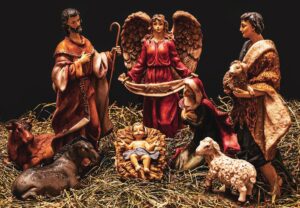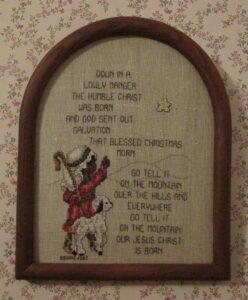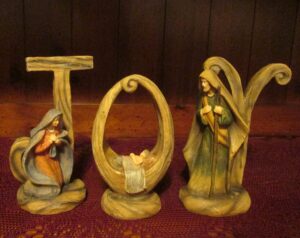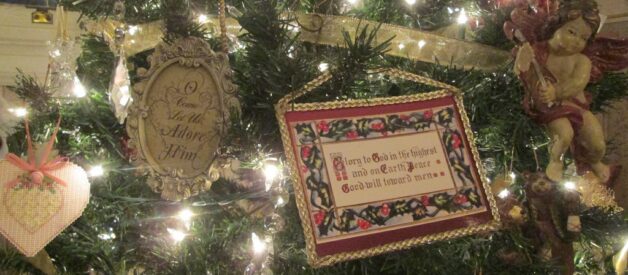I’ve been doing some thinking about what Christmas—the holiday—is. For most of my life, I have understood it to be the time of year for the entire world to celebrate the birth of Jesus. After all, the word Christmas comes from Old English Cristes Maesse meaning Mass of Christ, a celebration of the Messiah. So isn’t it obvious that Jesus should be the object of our attention this time of year?
Because I believe this, some aspects of the season have always bothered me—to the point of greatly disturbing my enjoyment of this time of year. All of them concern leaving Jesus out of the picture. The three items that top my list are “holiday” signs, commercialism, and Santa.
I have been troubled by stores and other entities intentionally replacing Christmas with Holiday on their signage and advertisements. And it irked me when clerks wished me a “Happy Holiday.” I wonder: Have they been forbidden to speak the word Christmas? A nonprofit organization creates annual Naughty and Nice lists of companies according to evidence of the Christian holiday in their ads, decorations, and inventory. I have been sorely tempted to avoid the “naughty” stores during my Christmas shopping.

Another troubling aspect of Christmas is the huge emphasis on gift giving. It seems as if it’s everyone’s birthday except Jesus. I remember as a child the excitement of looking through every page of the toy section in the Sears catalogue and writing out my list of all the items that would bring me joy on Christmas morning. Of course, I didn’t get them all, but I got a lot—in spite of it being someone else’s birthday.
The stores do anything they can to bring customers in. They know what we “need” to make our Christmas great. It seems mutually beneficial: The companies rake in the money while we feed our greed. But neither money nor greed is embodied in the birthday Child.

And then there’s Santa, the character who seems to take center stage. I think it’s a game to the parents—but a serious one they try to keep going as long as possible. In my first year of teaching, I got in trouble with my principal after a parent complained that I told her child Santa wasn’t real. Oops. I thought I was supposed to stick to facts in the classroom.
My major problem with Santa is that although parents are pretending, the children aren’t. They really believe. What does that do to the child when he finds out the people he has trusted most have been lying to him? Does it affect his ability to believe in things that are true?

This Advent season I did some research into when Christmas began—and it surprisingly led me to a new way of looking at the holiday. I found Cristes Maesse dates back to 1038 according to the Catholic Encyclopedia, and evidences of celebrating the birth of Christ go back at least to the fourth century. But then I discovered that during that time, there were already festivals that celebrated the midwinter solstice. And still earlier in ancient times, the Romans honored the god of agriculture with the festival of Saturnalia. These pagan festivals were in December.
Though no one knows the actual date of Jesus’ birth, one theory about why December 25 was chosen is that if Christmas was celebrated the same time as the pagan festivals, people might be encouraged to follow Christ. Regardless of why that date was chosen, though, it is clear that the Christian celebration borrowed many customs from those pagan festivals.
Yule is another name given to Christmas and was widely used by the early 900s. However, it is from an old Germanic word for the winter solstice feast and refers to rebirth, the new year, and the return of the sun. It had nothing to do with Jesus. Homes were decorated with evergreens and candles. People came together for traditional feasts. Mistletoe was believed to have magical properties, and holly was believed to repel negative energy. The “Yule” tree was a symbol of rebirth, light, and life. Farther back during the ancient festival of Saturnalia, wreaths and greenery were used in homes, as well as decorated trees to celebrate light. And there are numerous other borrowed customs.

Discovering how so many of our Christmas traditions originally honored pagan gods caused me to realize that the Christmas holiday has always meant different things to different people. Around December 25 every year in the fourth century, many people did celebrate the birth of Christ, but at the same time many others were celebrating their little g gods, the change of season, or the hope of returning light. Or maybe they just enjoyed the feasting aspect. And it’s no different today.

During the Christmas season, people celebrate around the things that are important to them. How can I expect someone to get excited about celebrating the birthday of a person they don’t even know? Not everyone shares my focus for Christmas. So I’m rethinking my Big Three.

I can respect someone’s choice of “holiday” celebration. Though I may prefer shopping in a store that shouts the birth of Christ from the highest shelf, I won’t refuse to visit the ones on the “Naughty List.” I don’t know their reasons and can’t judge their decisions. And they just may be in need of some Christmas cheer spread up and down their aisles.

I can hardly argue about the practice of gift giving when God is the best gift giver ever. There’s no end of his gifts to us—the greatest one being that of his Son, Jesus. But to avoid the trap of greed, everyone is personally responsible for their choice of how much emphasis to put on gifts.

And as for my anti-Santa stance . . . I recently spoke with my brother who is three years older than I am. Neither of us remembers ever believing in Santa, though I’m sure our parents were the typical Santa cheerleaders. We have no memories of trauma at the point of discovering the truth. We have no awareness of scars from being deceived. We survived childhood with a good grasp on reality. So maybe that’s another of God’s gifts: erasing potentially life-scarring events from our minds. Santa will still have no place in my Christmas, but again, I can choose to respect the decisions of others.

I’m sure my views will continue to shift as my knowledge increases, but my focus will always be on Jesus, who left a place of pure goodness to live among mankind so he could be our salvation. Since I can’t expect the entire world to celebrate Jesus, I’m finding I’m not so irritated at people not recognizing him at this time of year. Instead,

- I can rejoice that, even though at its inception Christmas merged with pagan festivals, “Christmas” has survived all these centuries as the name for this season. It’s Christmas—not Yule—we still find in the December 25 block on our calendars every year.
- I can rejoice that, through carols, nativity displays, special programs, and messages on Christmas cards and letters, the celebrations for Jesus spill over into the lives of people who may not even be looking for him, but for whom he is looking.
- I can rejoice that God gives us freedom to choose what is important to us. I am free to celebrate Christmas as I want and share that focus with others.
The change in the way I view Christmas is summed up in the word grace: grace for those who don’t see the Christmas I see. And that grace comes from the One whose birth I celebrate.






marilyn
December 15, 2022I love Christmas not for the hyped-up worldly view, but because the Bible foretold His first advent and it has also foretold His second advent! That’s why I love Christmas, because it reminds me that He is coming again and soon. Everyday I am waiting, like a bride preparing for her wedding day. Oh, I can’t wait!!!!
bspencer
December 15, 2022Truly, Christmas is a reminder that Jesus is coming back. His first advent was highly anticipated. It makes sense that this time of year would cause us great anticipation for His return. And our celebrations for Him now are such a very small snapshot of what our celebration will be on that day!
Thanks for that reminder, Marilyn.
Brenda Murphy
December 15, 2022Oh, I love that perspective! We told our kids Santa was a pretend game and then all enjoyed it, knowing the truth. But we had trouble with our kids telling the other kids … Grace allows us to celebrate Jesus and also enjoy whatever part of the holiday we want to. It does blow the mind how many of the things we consider “Christian,” even outside of Christmas, are taken from pagan traditions. You showed a wonderful way to practice grace and understanding, thank you. We can’t expect non-Christians to act like Christians. 🙂
bspencer
December 15, 2022Thank you, Brenda. I love it when we put a Christian slant on those customs that didn’t start out Christian. Like the candy cane. It isn’t likely it began as a Christian symbol, but I like how someone saw the white stripe as representing Jesus and the red stripe His blood. And, of course, it’s shaped like a J for Jesus. It doesn’t matter that it wasn’t the original intention. What a cool thing to share with children so they will maybe think of Jesus every time they see a candy cane.